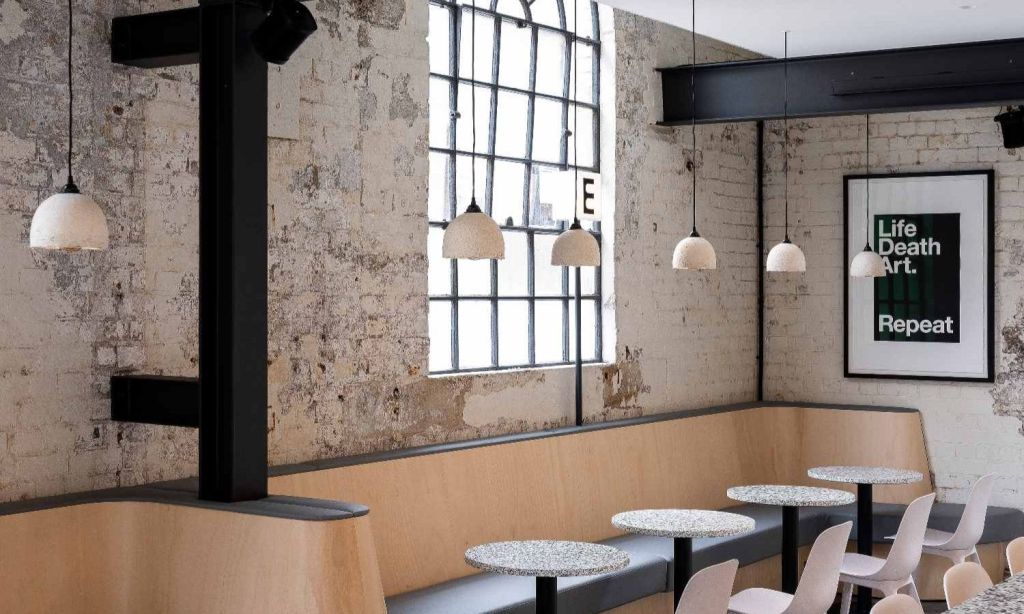The Latch has partnered with Suncorp Bank to deliver content to inspire you to live more sustainably this summer and beyond. Suncorp Bank is committed to providing banking services that are good for your world, our world, and the world. Find out more here.
Matt Whiley first brought his no-waste vision to life at Scout, a sustainability-focused bar in east London. Then, as we all know, a pandemic happened, shutting the doors to Scout forever. Whiley, then moved to Australia and saw the opportunity to pursue something bigger. Enter RE, Australia’s first no-waste bar.
Unlike other venues that claim to be no-waste, RE is pioneering the movement with its innovative approach to regenerative drinking. At RE, Whiley interrogates everything from the materials and glassware to the light fittings, ingredients and garnishes to what goes in the bin.
“We want to show how you can have an impact so that other venues can look at us, then do the same”, says Whiley. “Yes, RE is built on waste, but it’s this really incredible, refined space with heritage character. We want to change people’s expectations of what low-waste means and encourage others to build and operate this way.”
With RE, the approach to waste is world-leading, with every facet considered from the lens of sustainability. Built on diverted waste and leaning more twist than traditional, the drinks showcase the kinds of innovative techniques Whiley is known for, all served in reclaimed Maison Balzac glasses.
As part of Whiley’s ‘Never Wasted’ menu, he approaches Sydney’s top restaurants, essentially asking for their scraps. He’s worked with the likes of Lennox Hastie’s Firedoor and Josh Niland’s Saint Peter restaurant, turning Murray Cod fat into salted caramel to be used in a martini with passionfruit and fig leaf gin.
“We’re using the hibachi cinders from Firedoor to drip a drink through it in the hope it grows and evolves depending on what was cooked the night before. It’s all experimental,” says Whiley.
“Messina cuts off the tops of the strawberries for their strawberry sorbet, and that would normally just go in the bin,’ says Whiley. We get the pulp left over from juicing pandan, too, and the chocolate that gets stuck in the machine they use for tempering. All those elements make up the Messina drink. We hit the strawberries with liquid nitrogen to make them super frozen, then we break it down to a fine powder and infuse it with tequila. It’s such a strong, bright red strawberry flavour that comes from a part that nobody eats”.
It also works vice versa, explains Whiley. He gets a delivery of chaff (skin from coffee) but then passes on the byproduct to Mapo, who will make gelato with it. All the waste is collected by the Re team, although Whiley hopes that he will have 50 venues partaking in Never Wasted in the future.
Joining Whiley behind the bar are some of the city’s best bartenders, including Evan Stroeve (Bulletin Place), Jake Downe (This Must Be The Place; Scout London) and Ho Song (Cantina OK; PS40). Apart from the exceptional service level, the crew have creative license to work on the “Re- search” drinks, which are built around a changing theme.
“We chose this team because each and every one of them is experienced enough to run this place on their own,” says Whiley. “But more so, they share the goal of what we’re trying to achieve and how we want to deliver it; we want to make things seem like a normal cocktail bar, but when you peel back the layers, there’s something really cool and unique at its core”.
The food, overseen by Iceberg’s head chef Alex Pritchard, has a strong snack focus, with an eye on sustainable and reclaimed produce and enough tweaks to keep things interesting. Think puffed beef tendons with togarashi, house pickles, or bug tamales with schmaltz for smalls, and eggplant ceviche with salvaged padron peppers or air-fried corn ribs with miso butter for something more substantial.
“Never has this subject been more important. Food waste costs our economy $20 billion a year—more than five million tonnes of food ends up in landfill; one in five bags of groceries winds up in the bin. We are responsible for looking hard at what we’re not using and finding ways to make it desirable. At RE, we’ll showcase this through our bar program but also build a platform geared towards change on a global level. The time is now”.
Any representations, views or opinions contained in this article are those of The Latch and do not reflect those of and are not endorsed by Suncorp Bank.
Read more stories from The Latch and subscribe to our email newsletter.



